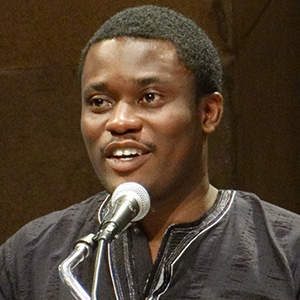Space Between Stories
A learning journey that navigates the transition from an old story, through the space between stories, to a new story.
Course Content
Session Four:
Decolonizing the Mind

with guest Bayo Akomolafe
How we gain knowledge, what we consider real, how we view sanity and disease, and what we consider a good life… so many things that we take for granted as unquestionable are considered absurd in other cultures.
In this session we are joined by Bayo Akomolafe, a rising Nigerian psychologist and intellectual who will explore with us the invisible habits of mind that are so much a part of the old story — personal and collective. How we gain knowledge, what we consider real, how we view sanity and disease, and what we consider a good life… so many things that we take for granted as unquestionable are considered absurd in other cultures. Even those of us in the radical subculture are often subject to the same habits of mind that lie at the root of our civilization’s crisis.
Bayo shares with us his journey from a Westernized education into the world of Nigerian shamans, lighting a path to liberation from the overlays of civilization (as we know it). We visit topics like: the power of not knowing the necessity to slow down the trap of efficiency the power of story
About Bayo
Bayo Akomolafe (PhD) is an ethnopsychotherapeutic researcher, lecturer and author from Covenant University in Nigeria. He is an international speaker, poet and activist for a radical paradigm shift in consciousness and current ways of living. He is Coordinator of the International Alliance for Localization. Bayo and his ‘life-force’, Ej, are currently on a journey to reclaim their lives and intimacy with the earth, with others and with community. He is writing his first novel, The Boy Who Stayed Outside. Ej and Bayo are ecstatic parents of a girl, Alethea.
Disenchanted with the single story about wellness and being he had received via his Eurocentric clinical training, Bayo embarked on a quest to seek out the less-than-obvious stories his own people had told for hundreds of years. He met with Yoruba shaman-priests who spoke glowingly about the vibrancy of the nonhuman world, the limitations of human agency and identity, and a more holistic notion of prosperity and abundance. They taught him the limitations of ‘the white man’s pills’ and urged a collective shift from the hubris of modernity to a deepened alliance with the web of life, saying: ‘In other to find your way, you must lose it’. For Bayo, the shamans reinvigorated his recognition of truth as sacred play. Bayo continues to examine through his writing and talks how stories give birth to reality. http://bayoakomolafe.net/
Decolonizing the Mind with guest Bayo Akomolafe
Assignment for Study and Deepening
One of Bayo’s main messages is to “embrace the darkness,” to embrace the unknowing, to be willing to lose your way. The treasure sometimes can be found only when we stumble. Therefore, he cannot tell us “what to do.” Yet he posed us with a question that is potent nonetheless: How can we find each other?
In the session, Bayo speaks of the Igbo libation ceremony, which gathers the community in the face of obstacles, of uncertainty, or perhaps a communal challenge or desire, and they pour their wanting or their helplessness or their grief into the earth. It is very similar to Lissa Rankin’s teaching of surrendering your desire to the universe. You pour it forth, letting it go at the same time as you put it into more capable hands (perhaps, for the Igbo, it is the ancestors’). The difference with the Igbo — and as far as I know, most traditional peoples — is that this is done in community. It is not the separate self with her journal, at her altar in her private home, silently making offerings in meditation, in private prayer.
Bayo’s question was posed in this context. How can we find each other, so that we can be in unknowing together, in grief, in helplessness? How can we be there for each other when we stumble? How can we be there to pick up the treasures found thereby? From what I have seen, no one can abide in a “new story” alone. Thich Nhat Hanh says, “The next Buddha will be a sangha.” Enlightenment is a group project.
So, my friends, how do we find each other? I pose this question not to solicit answers. As Bayo and I both like to emphasize, the rush to answers is part of the problem. Even the view of life as a series of problems to be solved is part of the problem. No, I pose this question as a magnet for stories, for visions, for hope or despair. The question stirs the pot, mixing the flavors and freeing the aromas that might beckon an answer beyond answers. As Bayo says, “The unthinkable is calling us.”
What does this question stir in you?
